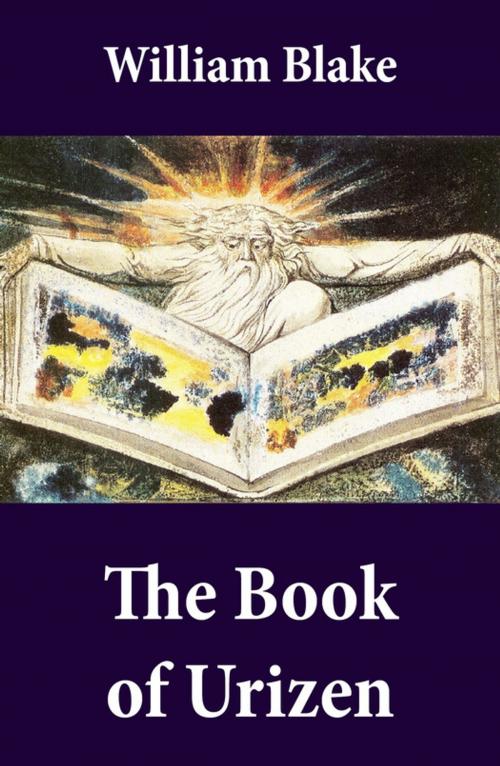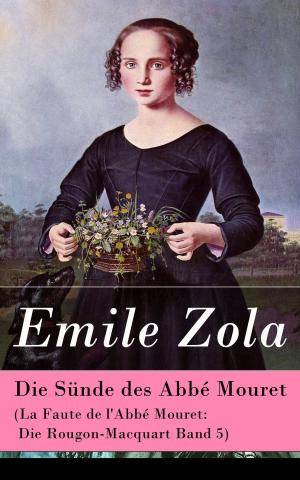The Book of Urizen (Illuminated Manuscript with the Original Illustrations of William Blake)
Nonfiction, Home & Garden, Crafts & Hobbies, Art Technique, Printmaking, Art & Architecture, Fiction & Literature, Poetry| Author: | William Blake | ISBN: | 9788074844096 |
| Publisher: | e-artnow | Publication: | August 21, 2013 |
| Imprint: | e-artnow | Language: | English |
| Author: | William Blake |
| ISBN: | 9788074844096 |
| Publisher: | e-artnow |
| Publication: | August 21, 2013 |
| Imprint: | e-artnow |
| Language: | English |
This carefully crafted ebook: "The Book of Urizen (Illuminated Manuscript with the Original Illustrations of William Blake)" is formatted for your eReader with a functional and detailed table of contents.
The Book of Urizen is one of the major prophetic books of the English poet William Blake, illustrated by Blake’s own plates. It was originally published as The First Book of Urizen in 1794. Later editions dropped the word “first”.
The book takes its name from the character Urizen in Blake’s mythology, who represents alienated reason as the source of oppression. The book describes Urizen as the “primeaval priest”, and describes how he became separated from the other Eternals to create his own alienated and enslaving realm of religious dogma. Los and Enitharmon create a space within Urizen’s fallen universe to give birth to their son Orc, the spirit of revolution and freedom.
In form, the book is a parody of the Book of Genesis, with Blake’s Urizen being more similar to the demiurge of the Gnostics than a benevolent creator.
The poems of William Blake reinterpret the spiritual history of the human race from the fall from Eden to the beginning of the French Revolution. Blake believed in the correspondence between the physical world and the spiritual world and used poetic metaphor to express these beliefs. In his poetry, we hear a man who look's for mankind to salvage his redemption from oppression through resurgence of imaginative life. The power of repression is a constant theme in Blake's poems and he articulates his belief in the titanic forces of revolt and the struggle for freedom against the guardians of tradition.
"William Blake (1757 – 1827) was an English poet, painter, and printmaker. Largely unrecognised during his lifetime, Blake is now considered a seminal figure in the history of both the poetry and visual arts of the Romantic Age.
This carefully crafted ebook: "The Book of Urizen (Illuminated Manuscript with the Original Illustrations of William Blake)" is formatted for your eReader with a functional and detailed table of contents.
The Book of Urizen is one of the major prophetic books of the English poet William Blake, illustrated by Blake’s own plates. It was originally published as The First Book of Urizen in 1794. Later editions dropped the word “first”.
The book takes its name from the character Urizen in Blake’s mythology, who represents alienated reason as the source of oppression. The book describes Urizen as the “primeaval priest”, and describes how he became separated from the other Eternals to create his own alienated and enslaving realm of religious dogma. Los and Enitharmon create a space within Urizen’s fallen universe to give birth to their son Orc, the spirit of revolution and freedom.
In form, the book is a parody of the Book of Genesis, with Blake’s Urizen being more similar to the demiurge of the Gnostics than a benevolent creator.
The poems of William Blake reinterpret the spiritual history of the human race from the fall from Eden to the beginning of the French Revolution. Blake believed in the correspondence between the physical world and the spiritual world and used poetic metaphor to express these beliefs. In his poetry, we hear a man who look's for mankind to salvage his redemption from oppression through resurgence of imaginative life. The power of repression is a constant theme in Blake's poems and he articulates his belief in the titanic forces of revolt and the struggle for freedom against the guardians of tradition.
"William Blake (1757 – 1827) was an English poet, painter, and printmaker. Largely unrecognised during his lifetime, Blake is now considered a seminal figure in the history of both the poetry and visual arts of the Romantic Age.















